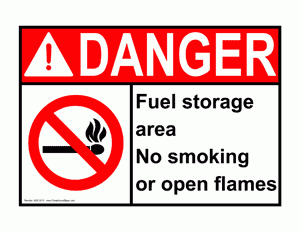Fuel Storage Safety

You may be storing fuel on your property for an emergency generator or to power up certain kinds of equipment. Fuels that require proper storage include gasoline, diesel, kerosene and propane. You should never attempt to store fuel without understanding and following safe fuel storage and handling practices, particularly those mandated by the Environmental Protection Agency (EPA)
EPA Warning
Unsafe fuel storage puts your health and safety at risk. It can also affect everyone around you. Fuel spills can contaminate the surrounding soil, wells and groundwater. The contamination can spread to sicken humans and animals who come in contact with it. Vapors from improperly stored gasoline and kerosene are dangerous to inhale and fatal in enclosed spaces such as a garage or basement. Fire and explosions can also be triggered by unsafe fuel storage.
Storage Containers
The EPA advises storing all fuels in specifically designed containers, the largest of which is the Underground Storage Tank (UST). According to the Alliance for Proper Gasoline Handling, all containers used in fuel storage should be built by an EPA-approved testing lab, such as the Underwriters Laboratory. Standard residential fuel tanks can safely hold up to 275 gallons, according to a "Backwoods Home" magazine article on fuel safety by Emory Warner.
Gasoline Storage Safety
Do not store gasoline near a potential heat source, such as a furnace, stove, space heater and even the trunk of your car, according to the Alliance. Gasoline should also never be stored in direct sunlight; select a cool, dry, well-ventilated place. Stored gasoline also needs to be treated with stabilizing chemicals as gas vapors can build to dangerous levels over time, according to Emory Warner.
Kerosene and Diesel
Emory Warner's article cites kerosene as one of the simpler fuels to store since it remains stable longer than gasoline. Like gasoline, kerosene should be stored away from heat sources, according to the National Agriculture Safety Database. Diesel fuel is also considered a safer type of fuel to store because it's difficult to ignite. But diesel should be kept away from both heat and dampness. According to the article, diesel fuel absorbs moisture when exposed to dampness. This can cause a sludge-like residue to form in the tank that can compromise the fuel.
Propane Storage Safety
Propane is a combination of liquid natural gas and crude oil. While propane was approved as a "clean" fuel alternative in the 1990 Clean Air Act, similar storage precautions should be taken concerning exposure to heat sources. Large propane tanks should be outfitted with "excess flow valves" for safety. These valves monitor the flow of propane; if the flow becomes excessive, the valve shuts off the flow. The EPA recommends installation of pressure relief valves.
Additional Safety Measures
Make sure your home or business insurance covers you for fuel storage. The EPA recommends you check fuel storage containers regularly for cracks and potential leakage points; replace compromised fuel storage containers immediately. Keep a chemical fire extinguisher near the pump end of storage containers. Never smoke or carry an open flame near fuel storage tanks.
EPA Warning
Unsafe fuel storage puts your health and safety at risk. It can also affect everyone around you. Fuel spills can contaminate the surrounding soil, wells and groundwater. The contamination can spread to sicken humans and animals who come in contact with it. Vapors from improperly stored gasoline and kerosene are dangerous to inhale and fatal in enclosed spaces such as a garage or basement. Fire and explosions can also be triggered by unsafe fuel storage.
Storage Containers
The EPA advises storing all fuels in specifically designed containers, the largest of which is the Underground Storage Tank (UST). According to the Alliance for Proper Gasoline Handling, all containers used in fuel storage should be built by an EPA-approved testing lab, such as the Underwriters Laboratory. Standard residential fuel tanks can safely hold up to 275 gallons, according to a "Backwoods Home" magazine article on fuel safety by Emory Warner.
Gasoline Storage Safety
Do not store gasoline near a potential heat source, such as a furnace, stove, space heater and even the trunk of your car, according to the Alliance. Gasoline should also never be stored in direct sunlight; select a cool, dry, well-ventilated place. Stored gasoline also needs to be treated with stabilizing chemicals as gas vapors can build to dangerous levels over time, according to Emory Warner.
Kerosene and Diesel
Emory Warner's article cites kerosene as one of the simpler fuels to store since it remains stable longer than gasoline. Like gasoline, kerosene should be stored away from heat sources, according to the National Agriculture Safety Database. Diesel fuel is also considered a safer type of fuel to store because it's difficult to ignite. But diesel should be kept away from both heat and dampness. According to the article, diesel fuel absorbs moisture when exposed to dampness. This can cause a sludge-like residue to form in the tank that can compromise the fuel.
Propane Storage Safety
Propane is a combination of liquid natural gas and crude oil. While propane was approved as a "clean" fuel alternative in the 1990 Clean Air Act, similar storage precautions should be taken concerning exposure to heat sources. Large propane tanks should be outfitted with "excess flow valves" for safety. These valves monitor the flow of propane; if the flow becomes excessive, the valve shuts off the flow. The EPA recommends installation of pressure relief valves.
Additional Safety Measures
Make sure your home or business insurance covers you for fuel storage. The EPA recommends you check fuel storage containers regularly for cracks and potential leakage points; replace compromised fuel storage containers immediately. Keep a chemical fire extinguisher near the pump end of storage containers. Never smoke or carry an open flame near fuel storage tanks.
- rb34e7a3893d8daaf4ffba31bc0c6cb4d3.jpg